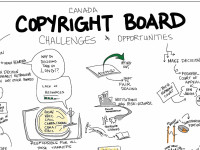Donald Trump’s stunning win of the U.S. Presidency on Tuesday night has sparked numerous articles speculating about the implications for various policies and issues. Given how little Trump said about digital policy, predictions about telecom or IP policy are little more than educated guesses. Trade policy was a major Trump issue, however, as his opposition to the Trans Pacific Partnership and vow to renegotiate NAFTA was repeated at virtually every campaign stop. Senate Majority Leader Mitch McConnell confirmed yesterday that the TPP would not be brought up for a vote this year, leaving Trump to decide on its future. Officials in other TPP countries such as Australia, New Zealand, and Malaysia have now acknowledged that the TPP is likely dead.
 Articles by: Michael Geist
Articles by: Michael Geist
The Missing Public Voice: My Comments on the Copyright Board at the Senate Banking Committee
The Senate Standing Committee on Banking, Trade and Commerce conducted two days of hearings last week on the Copyright Board of Canada. The hearings featured members from the Board, leading copyright collectives and associations, and a panel of individuals that included law professors and practitioners. Ariel Katz and Howard Knopf have already posted their opening remarks. My comments, which focused on the importance of the public interest in Copyright Board decision making and the need for greater public participation, is posted below.
Lost Confidence: Why Trust in Canadian Surveillance Agencies Has Been Irreparably Harmed
In the aftermath of the Snowden revelations in which the public has become largely numb to new surveillance disclosures, the Canadian reports over the past week will still leave many shocked and appalled. It started with the Ontario Provincial Police mass text messaging thousands of people based on cellphone usage from nearly a year earlier (which is not government surveillance per se but highlights massive geo-location data collection by telecom carriers and extraordinary data retention periods), continued with the deeply disturbing reports of surveillance of journalists in Quebec (which few believe is limited to just Quebec) and culminated in yesterday’s federal court decision that disclosed that CSIS no longer needs warrants for tax records (due to Bill C-51) and took the service to task for misleading the court and violating the law for years on its metadata collection and retention program.
The ruling reveals a level of deception that should eliminate any doubts that the current oversight framework is wholly inadequate and raises questions about Canadian authorities commitment to operating within the law. The court found a breach of a “duty of candour” (which most people would typically call deception or lying) and raises the possibility of a future contempt of court proceeding. While CSIS attempted to downplay the concern by noting that the data collection in question – metadata involving a wide range of information used in a massive data analysis program – was collected under a court order, simply put, the court found that the retention of the data was illegal. Further, the amount of data collection continues to grow (the court states the “scope and volume of incidentally gathered information has been tremendously enlarged”), leading to the retention of metadata that is not part of an active investigation but rather involves non-threat, third party information. In other words, it is precisely the massive, big data metadata analysis program feared by many Canadians.
CETA Implementation Bill Provides Reminder of the IP Cost in the Canada – EU Trade Deal
The Canadian government moved quickly from signing the trade agreement between Canada and the European Union on Sunday to tabling Bill C-30, the CETA implementing legislation, on Monday. While most of the attention has focused on the political issues surrounding CETA in Europe and the potential gains for Canadian exporters due to tariff reductions, the implementing bill provides a reminder that there are significant costs associated with CETA that have generated far less discussion. In fact, the majority of the 140-page bill features changes to Canada’s intellectual property rules, requiring changes that largely serve European interests.
Mandated reforms to patent protections (in the form of term restoration provisions) and the expansion of protections for dozens of European geographical indications was always part of the price to be paid for CETA. There were concerns expressed throughout the negotiations on both issues. Geographic indications rules grant protections to foods widely produced around the world and establish new marketing and naming restrictions on Canadian food producers. Meanwhile, the patent term restoration provisions are likely to increase health care costs in Canada by delaying the availability of generic pharmaceuticals due to the extension in the term of protection for patented pharmaceuticals.











